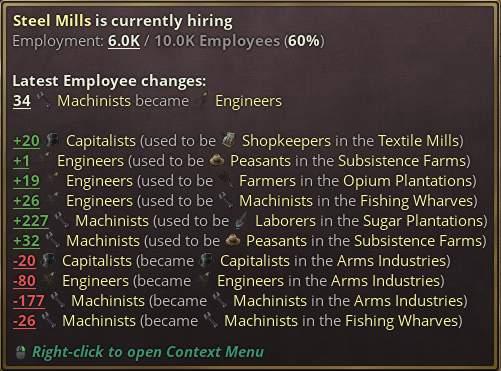
The most important aspect of pops are their professions, which reflects the types of jobs it carries out in the building where they work. A pop’s profession determines its social strata and can affect its wages, political strength, what other professions it might qualify for, and particularly which political interest groups it’s prone to supporting. Investing in industries that provide job opportunities for the kinds of professions the player would want to encourage in their country is key to the “society building” gameplay of Victoria 3.
Guide to Professions
Profession Change
All pops have a profession. Buildings need pops of specific professions to work in them in order for them to produce their intended effects on the economy and society. Different production methods change the number of profession positions available in a building.
The player has control over where these job opportunities are created, and combined with production methods cause demographic shifts to have stronger, more localized effects that are easier to predict and understand. The same profession can cause different effects in different buildings given different production methods. This means that higher-paid pops don’t by their very nature perform a more valuable societal function than lower-paid pops — rather, each acts as a crucial part of a production method’s “recipe”. Each of these roles require the others to be effective — without enough laborers to shovel coal, the engines the machinists maintain stay dormant, and without seamstresses to work the sewing machines the shopkeepers don’t have any clothes to sell.
Pops change professions as part of an automatic process without direct control from the player. That said, it is still advised to understand the mechanics behind it when building the country’s society. Doing so can help one ensure the population in one of the states are able to take on machinist jobs before embarking on a rapid industrialization project there, or for another to ensure they don’t accidentally enable too much social mobility in a country already prone to uprisings.

Recent employee changes in the steel mill building.
Profession Types
There are 15 pop professions (and an unemployed status) divided into 3 strata:
- Lower Strata

- Middle Strata

- Upper Strata

Employment
Employees are hired into available jobs from the pool of pops that already exist in the state, but unless they’re unemployed these pops will already have a job somewhere doing something else. Any openings will be first offered to existing engineers and only then to other qualified pops. Buildings won’t hire pops who don’t meet the qualifications for the profession in question.
Pops can be hired under two conditions:
- They must be offered a measurably higher wage than the wage they’re currently getting from their current employment.
- Unless they already work as the required profession in another building, they must also meet the qualifications of that profession to change into it.
Wages
Buildings adjust their wages, in response to market conditions, to achieve full employment with minimal wage costs. A building that has open jobs it can’t seem to fill will raise wages until it either fills the necessary positions or runs out of excess profits. Buildings won’t increase wages if this would cause them to go into deficit. In fact, a building that is losing money will decrease wages until it’s back in the black so there’s little point to expanding industries beyond the point where they’re profitable.
The wage adjustment leads to different buildings in the same state to compete for the available workforce. What this means in practice is that a large population with the necessary qualifications to perform all the jobs being created in the state will keep wages depressed and profits high. Only when industries are large or advanced enough that they need to compete with each other for a limited pool of qualified workers are wages forced to rise.
As employment increases, so does the throughput — the degree by which the building consumes input goods and produces output goods. According to supply and demand laws this makes a building less profitable per capita the closer to full employment it gets. That said, the rise in wages also comes with increased consumption, which increases demand for goods and services that some of the same buildings may profit from in the end.
Qualifications

List of potentially qualified engineers in the state of Lower Egypt.
A pop’s qualifications measure how many of its workforce qualify for certain professions. The number of qualified members within that pop is updated on a monthly basis depending on how well their current properties match up to the expectations of the profession in question. For example, a pop’s potential to become an engineer is increased if they have a higher literacy, are wealthier or if they work in an adjacent field such as a machinist. The number of potential engineers will continue to rise as long as they meet the profession’s required qualifications. Different professions will have different requirements. For example, at least a basic education level is required to become a machinist while a much higher one is required to become an engineer. Conversely, the ability to become an aristocrat is less about education and more about social class and wealth.
Qualified members being hired by a building will be split to a new pop belonging to the new profession and the workforce size of the old pop will be reduced by an equal number. If all the qualified members for a certain profession were hired than the old pop won’t accumulate any more members for that profession. The new pop will have its members retain the qualifications of their old profession. For example, newly hired engineers which used to be machinists will retain their machinist qualifications. Furthermore, if those new engineers used to be farmers before becoming machinist then they would retain their farmer qualifications as well.
Like all pop attributes, qualifications follow the pops as they split, merge, move between buildings, migrate, and die. This means that unless new pops are given the option to acquire the qualifications for a certain profession then when the old pop dies away there will be no qualified pops to replace them. This will lead the buildings that requires them to underperform until such pops will arrive at the state by some other way.
The intent of qualifications is to signal the player what capacity for employment they have available among any subset of their population. They cannot, for example, conquer a state filled with under-educated people they also legally discriminate against and expect to immediately build up a cutting-edge manufacturing- and trade center there. These efforts will be throttled by their inability to employ the locals into highly qualified positions, meaning they have to wait for members of their already qualified workforce to migrate there from the old country to take on any high-status positions created for them. But by building out their education system, paying bureaucracy to extend their administrative reach to the new state through incorporation, and changing their laws to extend citizenship to these new residents, they can start to build this capacity also in the locals.
In summary, qualifications is the mechanism by which access to education and the country’s stance on discrimination — in addition to many other factors — impact the player’s ability to expand different parts of their society. It is also the mechanism that sorts pops logically into the economic (and thereby political) niches being carved out as the country expands, ensuring the laws and economic conditions inform the social mobility of pops based on who they are. While generally subtle, it will become more apparent after running into the challenges caused by rapid industrialization, mass migration, conquests, colonization, and other drastic population shifts.





Be the first to comment